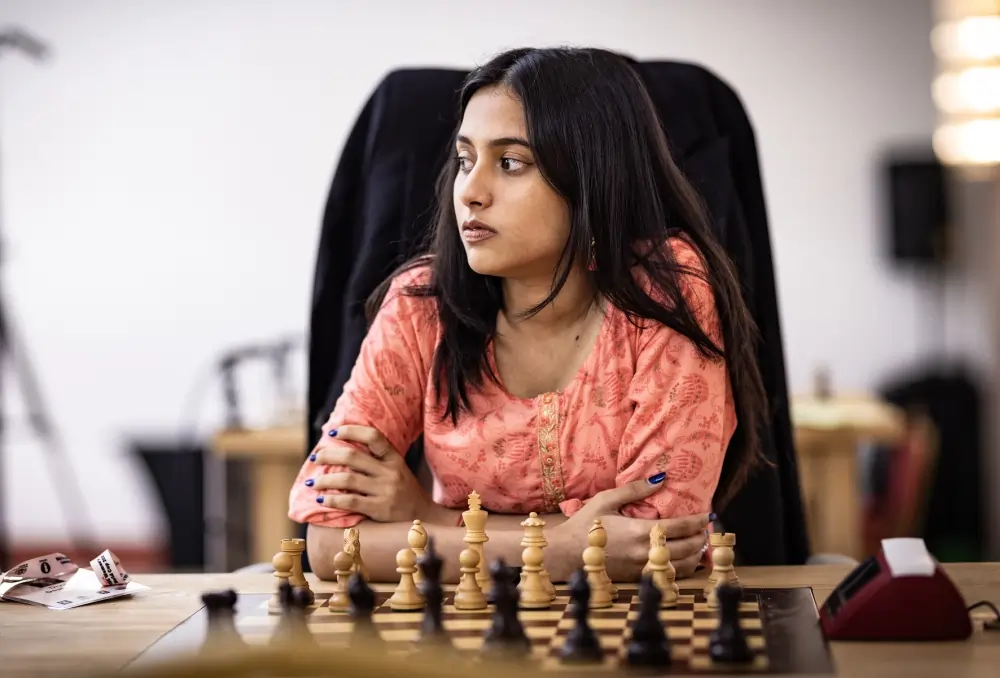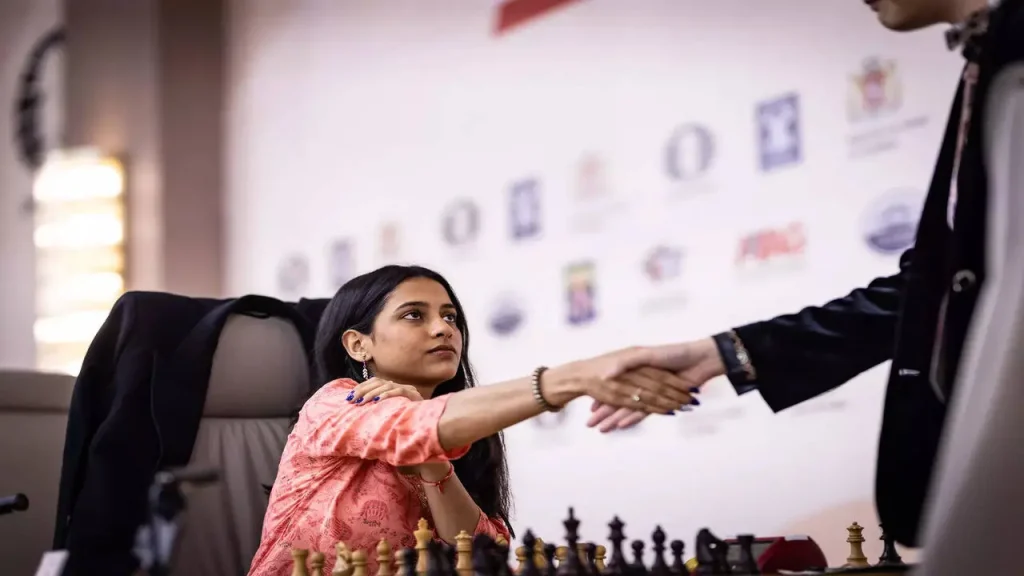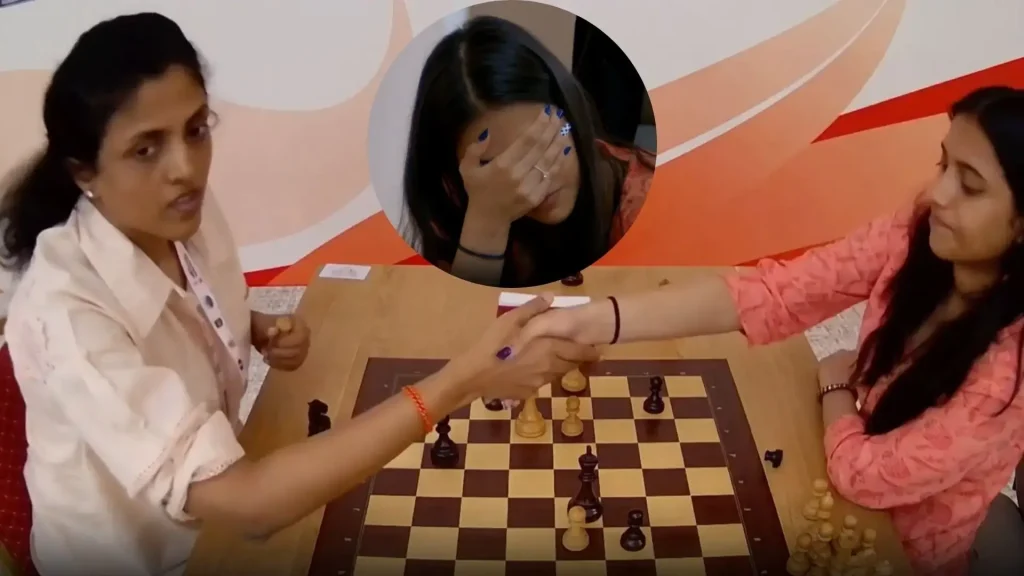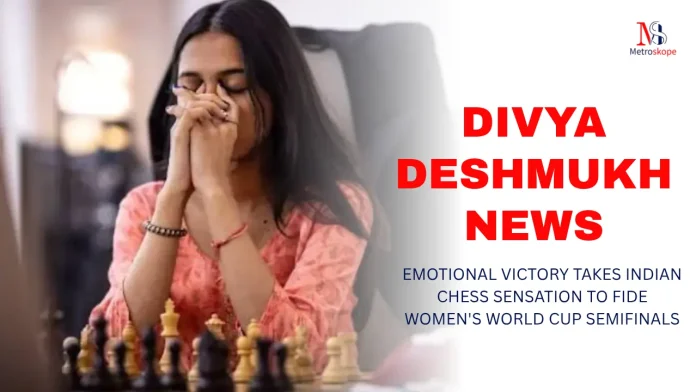In one of the most memorable moments of Indian chess history, 19-year-old Divya Deshmukh has scripted a fairytale run at the FIDE Women’s World Cup 2025,
defeating compatriot and veteran Grandmaster Harika Dronavalli in a thrilling quarterfinal encounter to become only the second Indian woman ever to reach the semifinals of this prestigious tournament.
The Emotional Victory That Captivated India
On July 21, 2025, at the picturesque venue of Batumi, Georgia, chess fans witnessed an extraordinary display of emotions as Divya Deshmukh secured her place in chess history.
After clinching the decisive tie-break victory with a commanding 2-0 scoreline, the young International Master was overcome with emotions, covering her face with her hands as she tried to process the magnitude of her achievement.

The image of Divya sitting at the board, taking a moment to steady herself even as her respected opponent left the playing area, became an instant symbol of the immense pressure and excitement that defines elite chess competition.
This wasn’t just a victory; it was a generational shift in Indian women’s chess.
About Divya Deshmukh: The Rising Star
Divya Deshmukh, born and raised in Nagpur, Maharashtra, represents the new generation of Indian chess prodigies. C
urrently holding the International Master title and ranked as the Junior World No. 1, Divya has been making waves in the chess world with her aggressive yet composed playing style.
Her journey to the semifinals has been nothing short of spectacular, showcasing the depth of talent in Indian women’s chess.
The teenager’s tactical acumen and mental fortitude have drawn comparisons to some of India’s greatest chess champions.
Harika Dronavalli: The Veteran Gracefully Bows Out
GM Harika Dronavalli, a stalwart of Indian women’s chess and multiple-time Olympiad gold medalist, fought valiantly throughout the tournament.
Despite the quarterfinal loss, Harika’s contribution to Indian chess remains immeasurable, having paved the way for younger talents like Divya to flourish.
The Quarterfinal Battle: A Tale of Two Games
Classical Games: Deadlock and Tension
The quarterfinal encounter between the two Indians began with two classical games that ended in draws, setting up the dramatic tie-break scenario that would determine who advances.
Both players demonstrated their class in the classical format, with neither able to gain a decisive advantage.
Tie-Break Drama: Where Champions Are Made
The real drama unfolded in the rapid tie-break games, where Divya’s tactical sharpness proved decisive.
Here’s how the crucial tie-breaks unfolded:
Game 1: Divya Seizes the Initiative
In the first 15+10 rapid game, Divya capitalized on a crucial endgame error by Harika.
The young IM demonstrated remarkable composure under pressure, converting her advantage with clinical precision to take a 1-0 lead in the tie-breaks.
Game 2: Missed Opportunities Prove Costly
The second tie-break game saw Harika fighting back desperately, creating several promising positions that could have leveled the match.
However, the veteran grandmaster missed a couple of winning chances in critical moments, allowing Divya to maintain her advantage and seal the victory.
Final Score: Divya Wins 3-1 Overall
| Format | Divya Deshmukh | Harika Dronavalli |
|---|---|---|
| Classical Game 1 | 0.5 | 0.5 |
| Classical Game 2 | 0.5 | 0.5 |
| Rapid Tie-break 1 | 1 | 0 |
| Rapid Tie-break 2 | 1 | 0 |
| Total Score | 3 | 1 |
Historic Achievement: India’s Double Delight
With Divya’s victory, India achieved a remarkable milestone – having two players in the FIDE Women’s World Cup semifinals for the first time in history.
This unprecedented achievement came courtesy of:
- GM Koneru Humpy – The first Indian to reach the semifinals, defeating China’s Song Yuxin with a dominant 1.5-0.5 score
- IM Divya Deshmukh – The second Indian to achieve this feat, overcoming Harika in the tie-breaks
This double representation guarantees India at least one spot in the 2026 Candidates Tournament, regardless of the semifinal outcomes.
The Semifinal Matchups: India vs China Showdown

The semifinals promise to be a thrilling India vs China battle, with both countries fielding two representatives each:
Semifinal Lineup
| Match 1 | Match 2 |
|---|---|
| GM Koneru Humpy (IND) | IM Divya Deshmukh (IND) |
| vs | vs |
| GM Lei Tingjie (CHN) | GM Tan Zhongyi (CHN) |
About Divya’s Opponent: Tan Zhongyi
Divya faces a formidable challenge in GM Tan Zhongyi, the 16th Women’s World Champion and a highly experienced campaigner.
The 34-year-old Chinese grandmaster reached the semifinals by defeating India’s R Vaishali with a 1.5-0.5 score, showcasing her class and experience.
Tournament Schedule and Viewing Details
Semifinal Schedule
| Round | Date | Time (IST) |
|---|---|---|
| Semifinal Game 1 | July 22, 2025 | 4:45 PM |
| Semifinal Game 2 | July 23, 2025 | 4:45 PM |
| Tie-breaks (if needed) | July 24, 2025 | 4:35 PM |
Live Streaming Information
Chess enthusiasts can catch all the action live on:
- FIDE’s Official YouTube Channel – Free live streaming with expert commentary
- ChessBase India – Comprehensive coverage and analysis89
Both Indian players will have the advantage of playing with white pieces in the first semifinal game, which could prove crucial in setting the tone for their respective matches.
What’s at Stake: The Road to World Championship
The FIDE Women’s World Cup 2025 is more than just a prestigious tournament – it’s a crucial step in the World Championship cycle.
Here’s what the remaining players are competing for:
Candidates Tournament Qualification
- Top 3 finishers automatically qualify for the 2026 Candidates Tournament
- The Candidates winner earns the right to challenge reigning World Champion Ju Wenjun of China
- With two Indians in the semifinals, India is guaranteed at least one Candidates spot
Prize Distribution and Ranking Points
The tournament also offers substantial prize money and valuable FIDE rating points that will boost the careers of all participants.
India’s Chess Revolution: The Bigger Picture
Breaking Historical Barriers
Divya’s achievement represents more than individual success – it symbolizes the evolution of Indian women’s chess.
For years, Indian men have dominated the global chess scene, but now the women are making their mark with equal determination and skill.
“Beating Zhu Jiner gave me confidence” – Divya Deshmukh’s reflection on her earlier round victory5
Divya’s emotional reaction after the quarterfinal victory highlighted the pressure young athletes face and their remarkable ability to perform under intense scrutiny.
Her composure throughout the tournament has impressed veterans and newcomers alike.
Inspiration for Future Generations
With role models like Koneru Humpy and rising stars like Divya Deshmukh, Indian women’s chess is experiencing unprecedented growth.
Chess academies across India are reporting increased enrollment from young girls inspired by these achievements.
Technical Analysis: What Made the Difference
Divya’s Tactical Brilliance
Chess experts have praised Divya’s tactical acumen and endgame technique throughout the tournament.
Her ability to maintain composure in critical moments, especially during the tie-breaks, demonstrated the mental fortitude required at the highest level.
Key Factors in the Victory
- Superior Endgame Technique – Divya capitalized on Harika’s crucial error in the first tie-break
- Pressure Handling – Maintained composure despite the high-stakes nature of the match
- Tactical Sharpness – Found the right moves in critical positions
- Youth Advantage – Her fresh perspective and fearless approach paid dividends
The Global Chess Community Reacts
FIDE’s Recognition
The International Chess Federation has been actively promoting the tournament, with official social media accounts celebrating India’s historic achievement.
The organization’s support has helped bring global attention to the remarkable performances of both Indian semifinalists.
Expert Commentary
Chess commentators worldwide have praised the quality of play and the significance of having two Indians in the semifinals.
The achievement is being hailed as a watershed moment for Indian women’s chess.
Looking Ahead: Semifinal Predictions and Analysis

Divya vs Tan Zhongyi: David vs Goliath?
While Tan Zhongyi brings vast experience and a former World Champion pedigree, Divya’s recent form and fearless approach make this a fascinating matchup.
The Chinese player’s experience in high-pressure situations could be crucial, but Divya’s tactical sharpness and current momentum cannot be underestimated.
The Pressure Factor
Playing in the semifinals of a World Cup brings unique pressures.
Divya’s emotional reaction to reaching this stage shows she understands the magnitude of the moment, but her ability to channel these emotions positively will be crucial.
India’s Chess Infrastructure: Building Champions
The Support System
The success of players like Divya and Humpy reflects India’s growing chess infrastructure:
- Improved coaching facilities across the country
- Government support for promising players
- Corporate sponsorship enabling international exposure
- Strong domestic tournaments providing competitive experience
The Role of Technology
Online platforms and digital coaching have revolutionized chess training in India, allowing young talents like Divya to access world-class instruction and compete against international opponents regularly.
A Historic Moment for Indian Chess
Divya Deshmukh’s emotional victory over Harika Dronavalli represents more than just a quarterfinal win – it symbolizes the coming of age of Indian women’s chess.
Her journey from a teenage prodigy to a World Cup semifinalist has captured the imagination of chess fans worldwide.
As she prepares for the semifinal battle against former World Champion Tan Zhongyi, Divya carries the hopes and dreams of a billion Indians.
Regardless of the outcome, her achievement has already secured her place in Indian chess history and inspired countless young players to dream big.
The India vs China semifinal showdown promises to be a chess spectacle for the ages, with both nations’ chess pride at stake.
For Divya Deshmukh, the girl who covered her face in emotional triumph, the journey continues toward what could be the greatest achievement in Indian women’s chess history.
With guaranteed Candidates Tournament qualification and a shot at the World Championship cycle, Indian women’s chess has never been in a stronger position.

